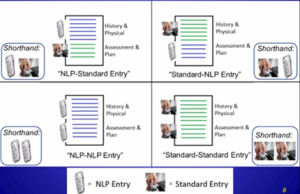Study finds NLP clinical documentation improves EHR usability performing 2.5X faster than standard EHR data entry using a keyboard and mouse for physicians.
Dictation is 61% more efficient than conventional EHR data entry, according to a ZyDoc research study sponsored by the National Institutes of Health. The project entitled “Applying NLP to Free Text as an EHR Data Capture Method to Improve EHR Usability” was performed with Columbia University physicians and compared the documentation quality, efficiency, and user satisfaction of conventional data entry in their Allscripts EHR to an alternative method allowing physicians to dictate representative admitting documents for three specialties. The alternative method (“NLP entry”) generated transcribed documents from dictations that were processed using natural language processing (NLP) to extract standard structured ICD-9, ICD-10, SNOMED®, RxNorm and LOINC® terms that are the basis of the next generation of EHR systems being implemented in October 2014.
Key Findings
Results of the study demonstrate that the dictation-based “NLP entry” method of EHR data entry using MediSapien™ performed better in efficiency, thoroughness, and usability, as compared to “Standard entry” using keyboard and mouse. In the study, dictation-based EHR entry (NLP entry) performed 2.5 X faster than the standard method of EHR data entry. The documents were more thorough and not statistically different in quality from those generated by Standard EHR entry, based on independent evaluation from Columbia documentation experts using a PDQI-9 tool to measure the documentation quality. Physicians rated the dictation NLP entry method as highly preferable at p<.01 significance. The study demonstrated that NLP can extract extensive structured data from unstructured transcription. The typical admitting notes each generated an average of 52 ICD-10 terms and a total of 392 ICD-9, ICD-10, SNOMED, RxNorm and LOINC standardized terms with many more modifiers. The results were similar for the three specialties studied of neurology, cardiology and nephrology, and were independent of age, sex and medical experience.

A hybrid method using standard keyboard and mouse EHR data capture for the history and physical portions of the exam while dictating with the NLP method for the assessment and plan was twice as fast as standard entry, with no difference in quality and was also rated as significantly more usable than the conventional method for both parts of the examinations. The hybrid method improved accuracy and thoroughness of the documentation, but the reduced succinctness of the final documentation showed it overall to be of similar quality to results produced by the standard EHR entry method.
According to Dr. Maisel, “While NLP has been promising, our research now proves that NLP may be an important tool for EHR data capture that will be preferred by doctors, and we are pursuing active commercialization of this disruptive, enabling technology. We are in the process of completing a live installation of this solution for a state mental health agency, utilizing front- and back-end speech recognition with automated insertion into their Meditech EHR system while providing NLP-derived analytic reporting from our database. We look forward to moving ahead to Phase II of the grant as we expand our commercialization of MediSapien to other EHRs and extend the process to scanning, legacy EHR semi-structured data and interoperability with other leading EHRs.
Doctors clearly have indicated they want to dictate. EHR entry is expected to raise the burden of data capture significantly, as ICD-10 is implemented because the number of diagnostic codes increases exponentially. We offer a viable alternative to minimize the effort required for EHR data capture with time savings without compromising quality. The NLP Clinical Data Repository also affords the opportunity to perform unprecedented analytic reporting and feed data-hungry applications and alert notifications and workflow triggers.”
Columbia University researchers participated in the study. A research collaborator on the study, David Kaufman, PhD, formerly a research scientist at Columbia University and now at the University of Arizona, offers this perspective, “Although EHRs are promising tools for improving healthcare, it is widely known that the user experience is frequently suboptimal resulting in dissatisfaction and low rates of adoption. This is partly due to the fact that clinicians spend many hours interacting with unwieldy systems documenting patient records. MediSapien is a promising instrument that may serve to reduce the cognitive burden on clinicians and enable EHRs to be instruments of clinical communication and tools that can greatly enhance patient care.”
